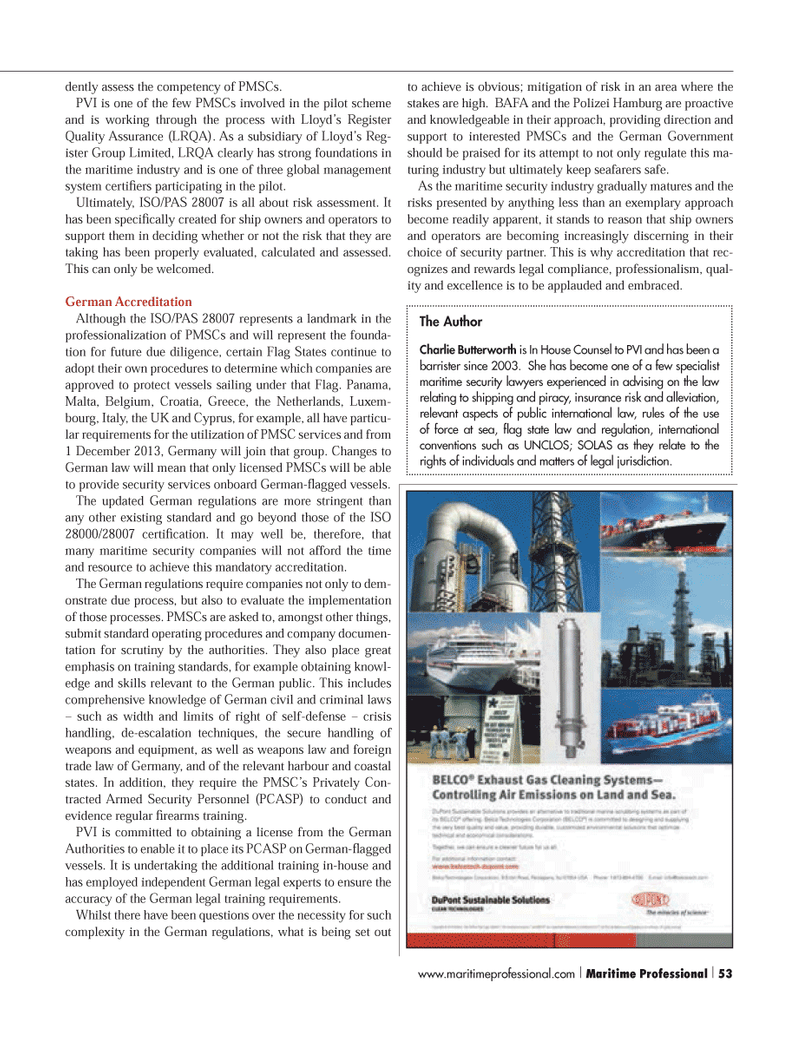
Page 53: of Maritime Logistics Professional Magazine (Q4 2013)
Shipbuilding, Repair
Read this page in Pdf, Flash or Html5 edition of Q4 2013 Maritime Logistics Professional Magazine
dently assess the competency of PMSCs. PVI is one of the few PMSCs involved in the pilot scheme and is working through the process with Lloyd?s Register Quality Assurance (LRQA). As a subsidiary of Lloyd?s Reg- ister Group Limited, LRQA clearly has strong foundations in the maritime industry and is one of three global management system certi ers participating in the pilot. Ultimately, ISO/PAS 28007 is all about risk assessment. It has been speci cally created for ship owners and operators to support them in deciding whether or not the risk that they are taking has been properly evaluated, calculated and assessed. This can only be welcomed.German Accreditation Although the ISO/PAS 28007 represents a landmark in the professionalization of PMSCs and will represent the founda-tion for future due diligence, certain Flag States continue to adopt their own procedures to determine which companies are approved to protect vessels sailing under that Flag. Panama, Malta, Belgium, Croatia, Greece, the Netherlands, Luxem- bourg, Italy, the UK and Cyprus, for example, all have particu- lar requirements for the utilization of PMSC services and from 1 December 2013, Germany will join that group. Changes to German law will mean that only licensed PMSCs will be able to provide security services onboard German- agged vessels. The updated German regulations are more stringent than any other existing standard and go beyond those of the ISO 28000/28007 certi cation. It may well be, therefore, that many maritime security companies will not afford the time and resource to achieve this mandatory accreditation. The German regulations require companies not only to dem- onstrate due process, but also to evaluate the implementation of those processes. PMSCs are asked to, amongst other things, submit standard operating procedures and company documen- tation for scrutiny by the authorities. They also place great emphasis on training standards, for example obtaining knowl- edge and skills relevant to the German public. This includes comprehensive knowledge of German civil and criminal laws ? such as width and limits of right of self-defense ? crisis handling, de-escalation techniques, the secure handling of weapons and equipment, as well as weapons law and foreign trade law of Germany, and of the relevant harbour and coastal states. In addition, they require the PMSC?s Privately Con- tracted Armed Security Personnel (PCASP) to conduct and evidence regular rearms training. PVI is committed to obtaining a license from the German Authorities to enable it to place its PCASP on German- agged vessels. It is undertaking the additional training in-house and has employed independent German legal experts to ensure the accuracy of the German legal training requirements. Whilst there have been questions over the necessity for such complexity in the German regulations, what is being set out to achieve is obvious; mitigation of risk in an area where the stakes are high. BAFA and the Polizei Hamburg are proactive and knowledgeable in their approach, providing direction and support to interested PMSCs and the German Government should be praised for its attempt to not only regulate this ma- turing industry but ultimately keep seafarers safe. As the maritime security industry gradually matures and the risks presented by anything less than an exemplary approach become readily apparent, it stands to reason that ship owners and operators are becoming increasingly discerning in their choice of security partner. This is why accreditation that rec- ognizes and rewards legal compliance, professionalism, qual- ity and excellence is to be applauded and embraced. The Author Charlie Butterworth is In House Counsel to PVI and has been a barrister since 2003. She has become one of a few specialist maritime security lawyers experienced in advising on the law relating to shipping and piracy, insurance risk and alleviation, relevant aspects of public international law, rules of the use of force at sea, ß ag state law and regulation, international conventions such as UNCLOS; SOLAS as they relate to the rights of individuals and matters of legal jurisdiction. www.maritimeprofessional.com | Maritime Professional | 53MP #4 50-63.indd 53MP #4 50-63.indd 5312/11/2013 2:06:50 PM12/11/2013 2:06:50 PM

 52
52

 54
54
